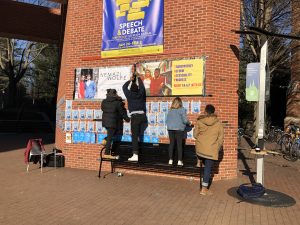It is once again time for another GUSA election cycle. This year, ten candidates have entered the bid for the seven open Class of 2028 Senate seats. Polls for the GUSA Senate elections open on Qualtrics on Tuesday, Nov. 5 at 8 p.m. and close Thursday, Nov. 7 at 8 p.m. As with years prior, the ballot will use a ranked-choice voting system that allows students to rank their candidate preferences.
On Nov. 4, The Hoya hosted three consecutive town halls for the upcoming GUSA Senate and Executive elections. The first of the town halls allowed the freshman vying for Senate seats to answer a series of moderated questions.
Meet the candidates
Harry Block (CAS ’28) shared that in accomplishing his dream of coming to Georgetown, he wants to serve on the Senate to “fully take advantage of my time here” and accomplish a wide range of goals.
Mikey Williams (SFS ’28), a Virginia native, shared that in his time thus far at Georgetown, the people around have shaped his experience. As a result, he said that he wants to serve in the Senate to “give back” to the people who have positively shaped his time here.
Amelia Snyder (SOH ’28) said that her bid for the Senate is rooted in her desire to be a voice for the freshman class.
“I do feel like there is sort of a disconnect between the freshman class and policy or just understanding what is happening at Georgetown as a whole,” she said. “I think that connecting the freshman class with GUSA and with the administration as a whole can really help make an impact and make the freshmen feel more at home.”
In a similar vein, Zadie Weaver (SFS ’28) said that she also wants to be a voice for the freshman class, but further emphasized her desire to work on alleviating the “small inconveniences” for example additional printing and laundry costs, that can hinder the student experience.
Tyler Chase (SFS ’28), another Virginia native, shared that through his prior experience in high school student government, he wants to continue being a voice for his peers.
“I hear people complain, and I want to turn those complaints into action,” he said.
Paul Nassar (SFS ’28) shared a similar motivation for running for the Senate.
“I have this need to make people feel included, having been in these different places and getting these different perspectives, it’s important to me to have people be seen,” he said.
Unlike many of her peers, who she believes represent the more typical government- and law-rooted interests in GUSA, Nikki Jiang (SOH ’28) believes that her experience in effecting change through health care policy would provide a useful new perspective to the GUSA Senate.
“I’m not interested in government or law whatsoever. I’m here to really make change,” she said.
Of the ten potential candidates, only seven were present during the town hall.
Student indifference and freshman involvement
Snyder attributed the lack of engagement to a lack of awareness, explaining that prior to her decision to run for Senate, she shared the feeling of disconnect felt by many members of the freshman class. She suggested that bridging this gap lies in an active effort from GUSA to engage students earlier on.
“I think that freshmen need to feel like they have a connection to the people who are representing them on GUSA,” Snyder said. “I think us just emphasizing that we are available to them will make them feel more connected.”
Chase added that the role of senators is to act as a conduit for the voices of the student body, and that he hopes to fully embody this mission if elected.
“I want to use my position to talk to people, and to take their concerns and bring them forward,” he said.
Jiang, however, attributed the disconnect between GUSA and the student body to a systemic reliance on “false promises” from candidates who hope to be elected. Instead, she suggested that senators should refocus on “realistic promises” in order to implement meaningful change.
Non-binding resolutions and maximizing the power of a senator
Next, candidates were asked about their perspectives on the non-binding nature of GUSA resolutions, and how they would plan to maximize their power as senators to maximize the resolutions passed under them.
Nassar said that he believes that the real power of GUSA’s resolutions “lies in the people.”
“The non-binding aspect of it doesn’t matter too much as long as it’s in the will of the students for it to be carried out,” he added.
Williams shared a similar sentiment, adding that he believes that achieving this power requires GUSA to better publicize its initiatives for students to “rally behind.”
“I think that starts with making yourself more available to the people,” he said.
Weaver, however, countered, saying that it is also important for senators to know how to work with administrators to see resolutions impact change for the student body.
“I do think that you need the voice of the people, but I also think you need people with experience who know how to run administrations or have worked with administrations,” she said. “I think you need that skill set and that’s kind of a unique thing that people don’t talk about.”
Jiang echoed both sentiments, but further emphasized that for senators to “keep it reasonable,” they should also have a good understanding of GUSA’s history and past successes in order to achieve effective and reasonable change.
Challenges for the freshman class
Finally, candidates were asked to share what they believed were the biggest challenges currently being faced by the freshman class.
Several of the candidates believed that one of the biggest challenges lies in the stress that comes with transitioning to college.
In order to address this concern, Jiang said that she would emphasize curating a more conducive learning environment for students. This includes better physical study spaces, but also improving accessibility within the classroom by standardizing access to virtual and recorded lectures, Jiang said.
In Block’s perspective, the solution lies in streamlining some of the smaller nuisances and time sinks in the student experience, like long wait times and limited hours at dining halls.
Although she agreed that increased access to study spaces and streamlining daily operations would majorly aid the new student experience, Snyder said that she believes a solution also lies in increasing access to stress management tools and meditative spaces across campus.
Nassar agreed, acknowledging that the transition period can be difficult for many new students and that GUSA can play a role in facilitating events and spaces that can help make freshmen feel more comfortable within their new environment.
“It can get overwhelming, and we need to manage that for the people that are new to an environment they don’t know,” he said.
Williams, however, said that the biggest challenge for freshmen lies in lack of access to and awareness of events and available resources on campus. He said that a more active social media campaign would help to improve the dissemination of information to new students.
Weaver echoed this sentiment, sharing her perspective that a curated freshmen newsletter could also be an effective way to improve freshmen access to and knowledge of events, opportunities, and resources.
Chase also had a different perspective on the biggest challenges facing freshmen, adding that he believes food access is a big issue at Georgetown. He also said that addressing this issue requires actionable steps rather than regurgitating the same complaints.
“It’s easy to say, let’s extend the hours, and that sounds great, I’d love it, but obviously it’s a lot more of the ‘how do we do something?’ rather than ‘what do we want to see?’” Chase said.
He suggested that one way to alleviate food access issues would be to reallocate staff at Leo’s on weekends to allow for both floors of the dining hall to operate simultaneously throughout the weekend.
Lightning Round
The town hall concluded with a series of lightning round questions where candidates were asked to summarize their policy priorities if they were to be elected, and give a yes or no response to a series of four questions.
What is your number one policy priority?
Jiang: “Increased transparency with the school and students, whether it’s construction or how things are working on campus and the resources.”
Nassar: “Increasing things like lighting in darker places on campus to just make it a safer environment for everyone, make it feel safer.”
Chase: “Shifting and not extending dining hall hours.”
Weaver: “Giving us more free stuff.”
Snyder: “Increasing communication between the freshman class and GUSA to make sure their voices are heard.”
Williams: “Making Georgetown more available to the student body.”
Block: “Making information about what’s going on around campus more accessible to the student rather than having to go to five different places to figure it out.”
Do you support ending legacy admissions at Georgetown?
Jiang: Yes
Nassar: Yes
Chase: No
Weaver: No
Snyder: Yes
Williams: No
Block: No
Do you support continued investment in the Capitol campus?
Jiang: Yes
Nassar: Yes
Chase: Yes
Weaver: Yes
Snyder: Yes
Williams: Yes
Block: Yes
Do you believe that Georgetown should join the CommonApp?
Jiang: Yes
Nassar: No
Chase: Yes
Weaver: Yes
Snyder: Yes
Williams: No
Block: Yes
Should GUSA implement public attendance records for senators?
Jiang: Yes
Nassar: Yes
Chase: Yes
Weaver: Yes
Snyder: Yes
Williams: Yes
Block: Yes






